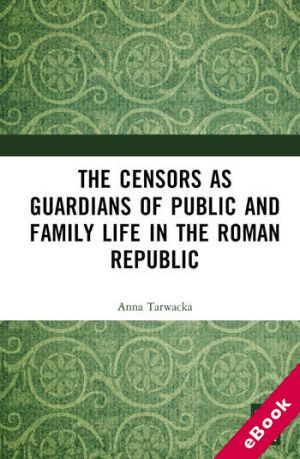We are now closed for the Christmas and New Year period, returning on Monday 5th January 2026. Orders placed during this time will be processed upon our return on 5th January.

The device(s) you use to access the eBook content must be authorized with an Adobe ID before you download the product otherwise it will fail to register correctly.
For further information see https://www.wildy.com/ebook-formats
Once the order is confirmed an automated e-mail will be sent to you to allow you to download the eBook.
All eBooks are supplied firm sale and cannot be returned. If you believe there is a fault with your eBook then contact us on ebooks@wildy.com and we will help in resolving the issue. This does not affect your statutory rights.
This volume explores the effects of the Roman censorial mark (nota censoria) and the influence of censorial regulations on the development of written law in ancient Rome.
The censor was one of the most fascinating legal institutions of Republican Rome. The most colourful and anecdotal area of censorial activities was in the upkeep of public morals (regimen morum); in carrying out this duty, censors controlled private, even intimate, aspects of Roman life. The office of the censor has been studied by various scholars from prosopographical, historical, and social perspectives. There is, however, no extensive study of the impact of the censors on the development of written law. This book provides an overview of the applications of the nota censoria to demonstrate its impact on the development of numerous regulations in the field of private and public law in both the Republican and Imperial periods. It explores the relationship between magistrate law (ius honorarium) and regimen morum and how the activity of the censors in this area influenced the formation of praetorian edicts, as well as later legislation of the principate period, most notably the marriage laws of Augustus. In examining the influence of the censor and the censorial nota in these spheres, readers gain a new understanding of the overall significance of the office of censor in the formation of the Roman legal order.
The Censors as Guardians of Public and Family Life in the Roman Republic is of interest to students and scholars of Roman law in both the Republican and Imperial periods, but also to those working on Roman moral attitudes and society more broadly.